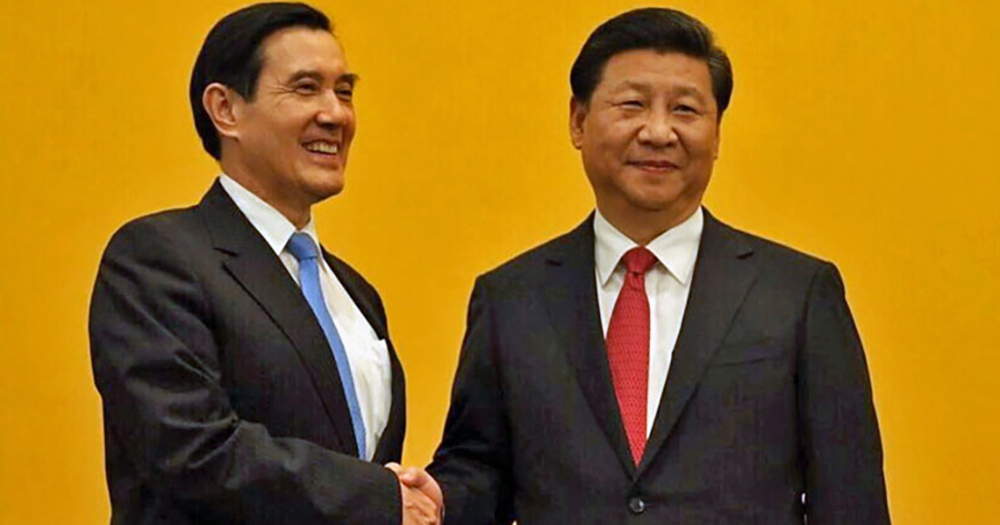Former Taiwan President Ma Ying-jeou said in an interview with German media Deutsche Well (DW) published on Jan. 10, 2024 that "you have to" trust China's President Xi Jinping when it comes to cross-strait relations.
Taiwan presidential elections on Jan. 13, 2024
Ma's interview comes days before the Jan. 13 elections, when the Taiwanese public will elect a new leader to succeed President Tsai Ing-wen.
In the running are William Lai Ching-te from the incumbent Democratic Progressive Party (DPP), Hou You-ih from the main opposition party Kuomintang (KMT), and Ko Wen-je from the Taiwan People's Party (TPP).
Lai, who is currently Taiwan's Vice President, is broadly seen as the frontrunner in the election as reported by Associated Press (AP), Reuters and The Guardian.
Trailing close behind is Hou, followed by Ko in third place, according to the most recent polls. However, Taiwan has a polling blackout in the final days before the election, which means that the last public polls were published on Jan. 2.
Peace vs war
Both China and the KMT have framed the election as a choice between peace and war, amidst rising tensions between Taiwan and China.
Unlike its rival DPP, the KMT has been broadly known to favour closer ties with China.
This is arguably reflected in each party candidate's approach to cross-strait relations.
KMT's Hou has pledged to restart dialogue with China and employ deterrence and de-escalation, which is all part of his "3Ds tactic".
DPP's Lai has said he would "pursue peace through strength" but said he remains open to engagement with China under preconditions of "dignity" and "equality".
However, both parties and their candidates draw the line at being outrightly pro-Beijing.
Ma's record as Taiwan president
Ma, who was from KMT, is known for thawing relations between Taiwan and China during his two-term presidency from 2008 to 2016.
This includes inking the Economic Cooperation Framework Agreement with China in 2010, which has been widely hailed as a landmark trade agreement, and meeting with Xi in Singapore in 2015.
The historical meeting was the first time in seven decades that leaders from Taiwan and China have met since the end of China's civil war in 1949.
Said Ma in the DW interview: "During all my term, I'm doing that. I visit the mainland. I try to make friends with them. And we try to actually promote closer ties."
Ma says Lai makes China "very nervous"
Despite "some problems with the mainland", Ma said cross-strait relations were "so peaceful" during his time as president, and never reached the stage of military action.
Ma, who was succeeded by DPP's Tsai Ing-wen in 2016, blamed the DPP for the "intensification" of the threat of Chinese invasion in recent years.
"But the DPP is different, because they have a lifelong belief of Taiwan independence [and] that is the biggest no-no for mainland China," said Ma, who added that China is watching the elections very attentively.
Ma said China will be "very nervous" about DPP's presidential candidate Lai as he is a firm long-time supporter of Taiwan independence.
He issued a warning: "Current opinion polls suggest that [the Taiwanese public] will vote for the DPP again. Well, if that is their choice, then they will have to be prepared for some kind of action from the mainland."
Despite Ma's claim, Lai has recently asserted that he will maintain the status quo and pushed back on the label of being "pro-independence".
Ma says Taiwan cannot win in a war with China
Ma said the use of deterrence to deal with cross-strait relations is very difficult as he believed that Taiwan could not win in a war against China, and doubted that the U.S. would get involved.
"You can never win. They're too large, much stronger than us," he said.
Ma is also doubtful that U.S. President Joe Biden would come to Taiwan's aid.
"I don't think the U.S. would be directly involved. And they would try everything to avoid it, because if they get involved and have a face-to-face conflict with the mainland, that could lead to a nuclear war ... that would be disastrous."
Ma claims Taiwan doesn't want independence, and may accept peaceful, democratic unification
Instead, Ma advocates the "peaceful resolution of the dispute" using non-military means to reduce tensions between Taiwan and China, such as fostering closer ties with China.
Ma said Xi is not only someone Taiwan can work with, but someone "you have to" trust when it comes to cross-strait relations.
In response to an assertion from the interviewer that Xi in his New Year's message seemed to be pushing for unification, Ma disputed this, and said that Xi understands that unification cannot be achieved overnight.
"It will take many, many years, and has to get the consent of the people," Ma added.
He said that unification is possible, but has to be done peacefully and democratically. Ma also pointed out that "democratic unification" is in the Taiwanese Constitution. If this could be achieved, Ma believes it would be "acceptable" to Taiwan.
On the possibility of Taiwanese independence, Ma said "I do not think that is something that people in Taiwan are doing or want to do."
Ma maintained his stance, that the Taiwanese population will not support Taiwanese independence, claiming that it would result in war, after the interviewer cited a poll where most of the subjects reported wanting to keep the status quo, and only two per cent of the subjects said unification is possible.
"I think the majority of the people understand Taiwan independence in cross-strait relations is something very, very dangerous."
However, he relented slightly and said that the people in Taiwan do not want unification "at the moment".
You can watch the video below:
More Ma
Top image via

If you like what you read, follow us on Facebook, Instagram, Twitter and Telegram to get the latest updates.



